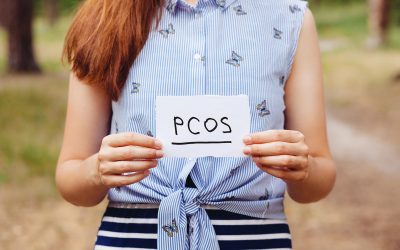PCOS is a common but complex condition that impacts the body in many ways. Nutrition modifications are helpful for symptom management, however recommendations can often be conflicting and confusing. Taking an individualized approach that’s tailored to your unique dietary needs is a helpful way to find an eating pattern that works best for you.
The Food Police
Women with PCOS are often told to “just lost weight” when they are actually faced with opposing factors like difficulty losing weight, increased carbohydrate cravings, and conflicting advice around nutrition. A quick Google search displays just how confusing and restrictive PCOS nutrition recommendations can be, which can lead to unnecessarily cutting out foods and increased stress around eating.
In their book, Intuitive Eating, Evelyn Tribole and Elyse Resch describe “The Food Police” as a strong voice that dictates all of your dieting and food rules, building strength with each new food plan or diet. The Food Police judges our every action around food, keeps us at war with food and our body, and ultimately results in a disconnection between our mind and body.
Navigating Common Food Fears
Below are four food categories that are commonly recommended to be avoided by those with PCOS. Unfortunately, these recommendations often don’t have individualized nutrition in mind and are more of blanket statements. Factors that are often left out of the explanation are the type and quality of the food, as well as your unique body response. These factors will be helpful when determining whether or not these foods have a place in your diet.
Dairy
When it comes to PCOS, dairy products are commonly lumped into one category of foods to avoid rather than breaking down the factors to consider. For those that have a true dairy allergy, consuming dairy products can be dangerous due to the immune response that occurs – typically in response to the casein or whey protein. An immune response will cause immediate symptoms like hives, wheezing or even throat swelling. While a true dairy allergy is rare, lactose intolerance is much more common, and causes digestive symptoms like abdominal cramping and diarrhea.
The type of dairy product is another important factor to consider. For example, whole milk dairy products have been shown to be more favorable for fertility and PCOS than low-fat and fat-free dairy products, due to the positive impact that that fat content has on blood sugar regulation. There is also an association between low-fat milk intake and an increase in insulin like growth factor 1 (IGF-1), androgen production, acne, and reduced insulin sensitivity.
This all to say, moderate amounts of whole milk yogurt and cheese as well as whole milk can be a part of a balanced diet as long as they are well-tolerated and enjoyed.
Gluten
There is no evidence suggesting that a gluten-free diet will improve PCOS symptoms. However, reducing refined grains as a whole (gluten-containing and gluten-free), will be supportive for reducing insulin resistance. Refined grains like white bread, pasta and flour are stripped of fiber and nutrients, and cause blood sugar spikes and crashes. Many refined and processed gluten-free products also contain added sugars and additives. Instead, aim to include moderate servings of whole grains like wild rice, farro and quinoa for more fiber, vitamins and minerals.
However, for those with diagnosed celiac disease, a gluten-free diet is essential for health maintenance. If you are suffering from digestive issues, but had a negative celiac test, it may be helpful to work with a nutritionist, dietitian or naturopathic doctor that specializes in gut health to help determine dietary modification without causing additional harm.
Carbohydrates
Low-carbohydrate diets are popular in today’s diet industry and are often solely focused on the carbohydrate counts at meals which can lead to low fiber intake, high animal product intake, and high saturated fat intake. Not to mention, cutting out whole food groups, which can be challenging to stick to long-term.
Whole, plant-foods contain fiber, vitamins, and minerals, and give us energy to take on the day. Beans, lentils, fruits, vegetables, and whole grains are all examples of nourishing carbohydrates. Including these foods on your plate regularly, balanced with protein and healthy fats, will support blood sugar regulation. Refined carbohydrates on the other hand, are better off included as an occasional treat.
Sugar
Sugar is another commonly villainized food, yet it is very abundant in our food system. The more obvious sources of sugar include soda, candy, cake, and ice cream. However, sugar tends to hide in a lot of other processed foods like protein bars, granola, bread, and even pasta sauce. The USDA dietary guidelines recommend limiting daily added sugars to less than 10% of daily calorie intake. This is a general guideline, however it is important to be aware of sugar consumption due to its impact on insulin resistance.
Be mindful of your daily sugar intake by noticing where your sugar is coming from and how much of it is in your everyday foods. If you find that your daily intake is more than you’d like it to be, avoid the temptation to quit all sugar cold turkey. Instead, start with one thing at a time such as swapping out your original almond milk for the unsweetened version or replacing two sodas per day with sparkling water. Bringing awareness to your sugar intake and minimizing added sugars will be helpful for reducing your overall daily intake.
Reframing Food Fears
Overall, villainizing foods by creating rigid food rules can make healthy eating feel impossible! Take a minute to consider what your own food rules are and try to determine the “why” behind those rules. Consider why you might be avoiding the food or food group and how it is impacting you. Does the rule make you feel deprived? Does the rule make you feel better in your body? Or worse?
If you discover that a food rule isn’t serving you, there is always the option of reframing the rule or eliminating it altogether to see what happens. Reframing a rule could be as simple as giving yourself permission to have flexibility with that food by allowing it in moderation.
Examples of Reframing Food Rules:
- Food Rule: I avoid all sugar.
Reframe: I avoid sugar for the most part, allowing occasional treats that I enjoy.
- Food Rule: I avoid all carbs.
Reframe: For the most part, I choose whole food forms of carbohydrates like fruits, veggies, beans, and whole grains.
Eating healthy to support PCOS symptom management will look different for everyone. Hopefully this article helped you feel empowered to make healthy choices that nourish your unique body.
References
- Chavarro, J., Rich-Edwards, J., Rosner, B. and Willett, W., 2007. A prospective study of dairy foods intake and anovulatory infertility. Human Reproduction, 22(5), pp.1340-1347.
- Rajaeieh, G., Marasi, M., Shahshahan, Z., Hassanbeigi, F. and Morteza Safavi, S., 2014. The relationship between intake of dairy products and polycystic ovary syndrome in women who referred to Isfahan university of medical science clinics in 2013. International Journal of Preventative Medicine, 5(6), pp.687-694.
- Tribole, E. and Resch, E., n.d. The Intuitive eating workbook.
- Tribole, E., 2020. Intuitive Eating, 4th Edition : A Revolutionary Anti-Diet Approach. St. Martin’s Press.




